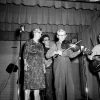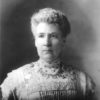calsfoundation@cals.org
Irene Robertson (1893–1959)
Irene Robertson was an interviewer and writer for the 1930s Federal Writers’ Project in Arkansas. She preserved the life stories and experiences of former slaves—or, in some cases, their children—then living in the counties of Crittenden, Lee, Monroe, Phillips, Prairie, and St. Francis. Using her straightforward style of reporting, she prepared 290 out of a total of 300 slave narratives produced in the above counties. She also prepared approximately 116 narratives from interviews with older white residents.
Irene Robertson was born in May 1893, possibly in Troy in Greenwood County, South Carolina, near the “Hard Labor” section of Edgefield County, where her parents had lived. Robertson’s father, Samuel Elisha Robertson, a farmer, was born in Edgefield County; he was a sharpshooter in General Joe Wheeler’s Confederate cavalry in the Civil War. Her mother, Sarah (or Sallie) Caldwell Robertson, lived in Troy at the time of her marriage. Robertson had two brothers, Walter and Samuel Arthur. In March 1906, Robertson’s father died and she, her mother, and Samuel Arthur moved to Hazen (Prairie County).
Robertson graduated from public school in Hazen in 1910, having completed the tenth grade. She appears in the 1911 Henderson-Brown College yearbook but does not appear in subsequent yearbooks and apparently received no degree. She was teaching in 1920 at a public school and lodging with Walter H. Smith and his wife, Jennie, in North Little Rock (Pulaski County). She may have been teaching with only a teacher’s certificate. According to Lela Clyde Scott of Hazen, Robertson was teaching school in Texarkana (Miller County) in the late 1920s or early 1930s. Robertson had talent as an artist and may have taught art there. When she was home from Texarkana, she would stay with her mother. Later, Robertson and Anna Bell Screeton taught at a one-room school south of Hazen.
In the mid-1930s, Bernie Babcock, supervisor of the Federal Writers’ Project in Arkansas, selected Robertson as one of the interviewers for the slave narrative project. Robertson and others were hired to interview former slaves or their children and record their experiences before, during, and after the Civil War. Robertson prepared more narratives from her interviews than any other writer on the state project. Opinions of her work were mixed, though primarily positive.
Her interviews with African Americans were conducted in Crittenden, Lee, Monroe, Phillips, Prairie, and St. Francis counties. She also interviewed many older white people in Arkansas, Lonoke, Monroe, and Prairie counties. Her interview narratives usually consist of direct quotes, reproducing dialect in varying degrees, as the occasion might require.
Details on Robertson and her family in later years are sketchy. She had a reputation in Hazen for “stirring things up,” possibly for reproducing in her narratives negative comments that Black and white people made about each other. As far as is known, she never married. She died in Pensacola, Florida, on October 29, 1959.
For additional information:
Cantrell, Andrea. “WPA Sources for African-American Oral History in Arkansas: Ex-Slave Narratives and Early Settlers’ Personal Histories.” Arkansas Historical Quarterly 63 (Spring 2004): 44–67.
Rawick, George F., ed. The American Slave: A Composite Autobiography. Westport, CT: Greenwood Publishing Company, 1972.
Sickel, Marilyn Hambrick, compiler. Prairie County, Arkansas: Pioneer Family Interviews by W.P.A.–Federal Writers’ Project, 1936–37. DeValls Bluff, AR: Grand Prairie Research, 1989.
Bill Sayger
Central Delta Depot Museum
 Early Twentieth Century, 1901 through 1940
Early Twentieth Century, 1901 through 1940 Folklore and Folklife
Folklore and Folklife Historic Preservation
Historic Preservation




Comments
No comments on this entry yet.